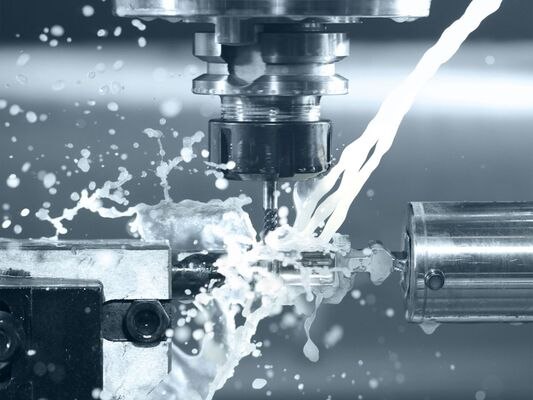How CNC Machines Are Revolutionizing Industrial Automation
Computer Numerical Control (CNC) machines have transformed industrial automation by improving precision, efficiency, and flexibility in manufacturing. From aerospace to automotive, medical devices to consumer electronics, CNC technology has become a cornerstone of modern production.
These machines, which operate based on programmed instructions, have replaced traditional manual machining methods, significantly reducing human error and increasing productivity. As industries strive for greater efficiency and innovation, CNC machines continue to revolutionize industrial automation in several key ways.
Precision and Consistency in Manufacturing
One of the most significant advantages of CNC machines is their unparalleled precision and consistency. Traditional machining methods rely heavily on human operators, leading to potential variations in product quality. In contrast, CNC machines execute pre-programmed instructions with exact measurements, ensuring consistent accuracy across multiple production runs.
For industries such as aerospace and medical device manufacturing, where precision is critical, CNC machines provide reliability that manual processes cannot match. These machines can achieve tolerances within micrometers, reducing material waste and ensuring that parts fit seamlessly into larger assemblies.
Increased Production Speed and Efficiency
According to a CNC machines Market report, the industry is expected to grow significantly in the coming years. CNC machines operate at high speeds without compromising accuracy. Unlike manual machining, which requires frequent adjustments and rest periods, CNC machines can run continuously with minimal human intervention. This increases production efficiency and reduces manufacturing lead times.
Furthermore, CNC machines can perform complex operations, such as drilling, milling, and cutting, in a single setup. This eliminates the need for multiple machines or manual repositioning, further streamlining the manufacturing process. As a result, manufacturers can produce high volumes of products faster while maintaining strict quality control.
Reduced Labor Costs and Human Error
Automation through CNC technology reduces the need for a large manual workforce, leading to lower labor costs. Skilled operators are still required to program, maintain, and supervise CNC machines, but fewer personnel are needed compared to traditional machining processes.
Additionally, CNC automation minimizes human error. In manual machining, mistakes in measurement, alignment, or cutting can lead to material waste and defective products. With CNC machines, once the program is set, the machine follows precise instructions every time, ensuring high accuracy and reducing the risk of defects.
Versatility and Complex Designs
CNC machines offer unmatched versatility, making them suitable for a wide range of industries. Whether cutting intricate patterns in wood, shaping metal components for automotive engines, or producing delicate medical implants, CNC technology allows for high complexity and customization.
Modern CNC machines can handle multi-axis operations, enabling manufacturers to produce intricate designs that would be difficult or impossible with conventional machining. The ability to switch between different materials, from metals to plastics to composites, further enhances the adaptability of CNC machines in industrial automation.
Integration with Smart Manufacturing and Industry 4.0
As industries embrace digital transformation, CNC machines are playing a crucial role in smart manufacturing and Industry 4.0. Many modern CNC machines are equipped with IoT (Internet of Things) connectivity, allowing real-time data collection and remote monitoring.
With predictive maintenance algorithms, CNC systems can detect wear and tear on machine components, reducing unexpected breakdowns and minimizing downtime. Integration with AI and machine learning further enhances CNC automation, optimizing machining processes for better efficiency and resource utilization.
Additionally, cloud-based CNC programming enables manufacturers to upload, modify, and store machining programs remotely. This ensures seamless collaboration between design teams and production units across different locations, fostering a more agile and interconnected manufacturing ecosystem.
Cost Savings and Sustainability
CNC machines contribute to cost savings by optimizing material usage and reducing waste. Their precision ensures that raw materials are used efficiently, lowering production costs. Additionally, automation reduces energy consumption by minimizing idle times and optimizing machining speeds.
Many manufacturers are also leveraging CNC technology to support sustainable practices. By using CNC machining to produce lightweight components, industries such as automotive and aerospace can reduce fuel consumption and emissions. Furthermore, the ability to recycle and reuse materials with CNC precision supports environmentally friendly manufacturing.
Future Trends in CNC Automation
As technology continues to evolve, the future of CNC automation looks promising. Some emerging trends include:
Hybrid CNC Machines: Combining CNC machining with additive manufacturing (3D printing) for enhanced material efficiency and design flexibility.
AI-Powered CNC Programming: Machine learning algorithms optimizing tool paths and machining parameters for better performance.
Robotics Integration: CNC machines working alongside robotic arms for automated material handling and assembly.
Augmented Reality (AR) for CNC Training: Enhancing operator training with AR-based simulation and visualization.
CNC machines are at the forefront of industrial automation, driving efficiency, precision, and innovation in manufacturing. Their ability to perform complex tasks with minimal human intervention is transforming industries worldwide. As smart technologies and AI integration continue to advance, CNC automation will become even more powerful, reshaping the future of industrial production. Businesses that adopt CNC technology stand to gain a competitive edge through improved productivity, reduced costs, and enhanced product quality Read More.




